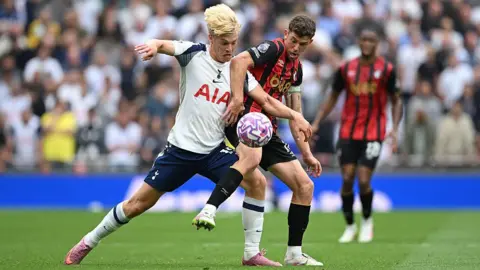Tottenham Hotspur’s board has stated that the club is not for sale, rejecting buyout interest following the departure of executive chairman Daniel Levy. ENIC Sports & Developments Holdings Ltd, which owns the majority stake, dismissed offers from Amanda Staveley’s PCP International Finance Limited and a consortium led by Dr. Roger Kennedy and Wing-Fai Ng. This decision reaffirms ENIC’s commitment to long-term stewardship and continued investment in the club.
Tottenham Hotspur's board has emphatically stated that the club is "not for sale," dismissing recent buyout interest following leadership transitions. The announcement, issued late Sunday, aims to quell speculation ignited by the departure of executive chairman Daniel Levy, whose exit last week fueled rumors of an impending takeover.
Levy's departure marks the end of an era. He held the position of Premier League's longest-serving chairman, accumulating over £50 million ($67.5 million) during his tenure. While his leadership brought stability and growth, Levy also faced criticism and protests from Spurs fans, particularly last season, highlighting the complex relationship between ownership and supporters in modern football.
According to the official statement, ENIC Sports & Developments Holdings Ltd, the club's ownership group, rejected two separate preliminary expressions of interest. One proposal came from Amanda Staveley's PCP International Finance Limited, a familiar name in football ownership circles, having previously held a stake in Newcastle United. The other originated from a consortium spearheaded by Dr. Roger Kennedy and Wing-Fai Ng through Firehawk Holdings Limited, indicating diverse interest in acquiring the North London club.
"The Board of the Club and ENIC confirm that Tottenham Hotspur is not for sale, and ENIC has no intention to accept any such offer to acquire its interest in the Club," the statement firmly asserted. This declaration underscores the current ownership's commitment to maintaining control of Tottenham Hotspur and dispels any immediate prospects of a change in ownership.
ENIC currently holds almost an 87% stake in Tottenham Hotspur, solidifying its dominant position. Within ENIC, UK businessman Joe Lewis and his family control the majority share, while Mr. Levy and his family retain approximately 30%. This ownership structure clarifies the decision-making process and reinforces the resolve to rebuff acquisition attempts.
The news arrives amidst significant developments within the club, including Levy’s departure and the appointment of a new chief executive. These structural changes raised questions about the future direction of Tottenham Hotspur, prompting increased interest from potential investors. However, ENIC's firm stance reaffirms its commitment to long-term stewardship and ongoing investment in the club's growth and success.
This decision will undoubtedly reassure fans who value stability and continuity at the club. Tottenham Hotspur remains one of the Premier League's most valuable and recognizable brands, possessing a state-of-the-art stadium and a passionate global fan base. ENIC's rejection of buyout offers suggests it intends to build on these foundations and continue pursuing on-field success while maintaining financial sustainability. As the club navigates this period of transition, its owners are keen to retain firm control and protect their significant investment.
The decision allows Tottenham to continue on their long-term strategy, focusing on player development, stadium utilization, and commercial growth. The club's recent performance, combined with its robust infrastructure, strengthens its appeal to players and sponsors alike. By retaining ownership, ENIC aims to harness these strengths and lead Tottenham Hotspur into a new era of achievement.
In light of these developments, stakeholders will carefully monitor the club’s trajectory in the coming months. The leadership transition will shape Tottenham Hotspur’s strategy and performance, and the ownership's commitment ensures a steady course. Tottenham Hotspur moves forward, focusing on its future prospects under the current ownership's guidance.
